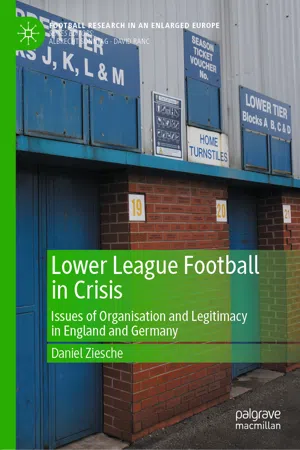The following four chapters form the second part of the empirical, analytical core of this volume and include the complete qualitative case study research, starting with a description of the case selection and case study design (Chapter “Qualitative Case Studies from England and Germany”)—to then move on to present the findings on adaptive strategies taken up by the studied clubs in three core fields that align with the three kinds of crises with which clubs are being confronted (Chapters “Economic Coping Mechanisms: Professionalisation, or—Creating Sustainable Structures”–“Social Coping Mechanisms: Societisation, Or—Improving Credibility as Social Institutions”).
The pressures outlined in the previous Chapters “Economic Crisis: Number Games”–“Social Crisis: Building Bridges” affect clubs on all levels. As has been shown, the lower leagues present a field where those pressures are more explicit in many regards and can thus be considered to affect the daily routines and long-term development strategies of clubs at these levels. In the following, strategies for how clubs react to the transformations which set them under pressure or which contribute to the crisis in which the clubs find themselves, both individually and collectively, will be presented.
The strategic agendas can be ordered into three ideal-typical fields—each of which addresses one of the three general crises elaborated on in Chapters “Economic Crisis: Number Games”–“Social Crisis: Building Bridges”:
1. Creating sustainable structures—i.e. reaction to the economic crisis
2. Re-engaging with local communities—i.e. reaction to the cultural crisis
3. Improving credibility, significance and value as social institutions—i.e. reaction to the social crisis
In combination, the strategies in these three fields ideally provide solutions to the threefold dilemma of legitimacy. Some fields might be addressed to a greater extent by some clubs than by others, and not every club will be equally addressed in every field. Again, many of the strategies or developments presented in the following chapters cannot be fully identified with each of the analytical, ideal-typical fields.
Communitisation and societisation processes can exist in a conflicting relationship with one another; sometimes they are even diametrically opposed. All-inclusive mechanisms at play in community programmes do not represent the realities within the football club’s internal fan communities. In these communities, collective identity formation is far more specific in terms of its construction than it is in more universally conceptualised community projects found in the urban community. Furthermore, more professional structures in terms of full-time employment or the separation of a capital company have the potential to disrupt relationships between the club and the club community. These dynamics, and how these conflicts appear and are addressed, will additionally be described in Chapters “Economic Coping Mechanisms: Professionalisation, or—Creating Sustainable Structures”–“Social Coping Mechanisms: Societisation, Or—Improving Credibility as Social Institutions”.
